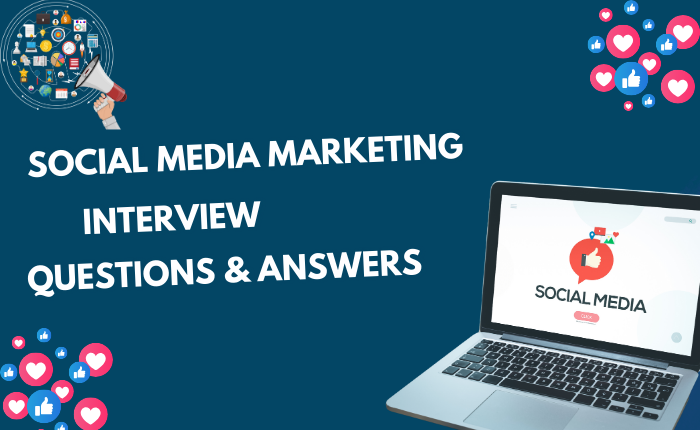Social Media Marketing Question And Answer
Social Media Marketing Question And Answer
1. What Is Social Media Marketing, and Why Is It Important for Businesses?
Social media marketing (SMM) is the use of social media platforms to promote products, services, or brands. It helps businesses increase brand awareness, engage with customers, generate leads, and drive website traffic.
2. How Does Social Media Marketing Differ From Traditional Marketing?
Traditional marketing relies on offline channels like TV, newspapers, and billboards, whereas social media marketing focuses on digital platforms for two-way communication, engagement, and real-time interaction with audiences.
3. What Are the Key Benefits of Social Media Marketing?
- Increased brand awareness
- Better customer engagement
- Higher website traffic
- Improved lead generation and sales
- Cost-effective advertising
4. Name the Top Five Social Media Platforms for Marketing.
Facebook, Instagram, LinkedIn, Twitter (X), and YouTube.
5. How Do You Decide Which Social Media Platform Is Best for a Business?
The choice depends on the target audience, industry, and business goals. For example:
- Facebook & Instagram – Best for B2C, e-commerce, and lifestyle brands.
- LinkedIn – Ideal for B2B and professional networking.
- YouTube – Best for video content and brand storytelling.
- Twitter (X) – Suitable for real-time updates, news, and public relations.
6. What Are the Essential Elements of a Successful Social
- Media Marketing Strategy?
- Clear objectives and goals
- Audience research and segmentation
- Content planning and creation
- Engagement and community management
- Performance tracking and analytics
7. How Do You Create a Social Media Content Calendar?
A content calendar includes planned posts, topics, formats, posting times, and platform specific strategies. It ensures consistency, improves engagement, and allows for better tracking of performance.
8. How Do You Set SMART Goals for Social Media Marketing?
SMART goals are:
- Specific – Clearly defined objectives
- Measurable – Can be tracked using metrics
- Achievable – Realistic based on resources
- Relevant – Aligns with business goals
- Time-bound – Has a deadline for achievement
9. What Factors Should You Consider When Planning a Social Media Campaign?
- Target audience demographics and behavior
- Platform-specific best practices
- Content format (images, videos, stories, etc.)
- Budget and resource allocation
- Performance measurement metrics
10. How Do You Conduct a Competitive Analysis for Social Media?
- Identify key competitors
- Analyze their social media presence (followers, engagement, content type)
- Study their strengths and weaknesses
- Compare performance using tools like Social Blade, Sprout Social, or Hootsuite
- Implement insights to improve your strategy
11. What Types of Content Perform Best on Social Media?
- Short-form videos (Reels, TikToks, YouTube Shorts)
- Engaging images and infographics
- Interactive content (polls, quizzes, Q&A)
- User-generated content (customer testimonials, brand mentions)
- Educational and how-to posts
12. How Do You Create Engaging Social Media Content?
- Understand audience preferences
- Use high-quality visuals and compelling captions
- Add call-to-actions (CTAs) to encourage interaction
- Post consistently and at optimal times
- Leverage trends and hashtags
13. How Important Is Video Content in Social Media Marketing?
Video content is highly engaging and preferred by most users. Platforms like Instagram Reels, TikTok, and YouTube prioritize video content in their algorithms, leading to higher reach and engagement.
14. How Can You Repurpose Content Across Multiple Platforms?
- Convert blog posts into social media carousels or infographics
- Turn webinars into short video clips
- Share customer reviews as Instagram stories
- Transform podcasts into quote graphics
15. What Are the Best Tools for Social Media Content Creation?
- Canva – Graphic design
- Adobe Premiere Pro / CapCut – Video editing
- Hootsuite / Buffer – Scheduling and management
- Grammarly – Proofreading captions and descriptions
16. What Are the Different Types of Social Media Ads?
- Image ads
- Video ads
- Carousel ads
- Lead generation ads
- Story ads
- Messenger ads
17. How Do You Set Up a Facebook Ad Campaign?
- Go to Facebook Ads Manager
- Choose a campaign objective (awareness, engagement, conversion)
- Define audience targeting (demographics, interests, behavior)
- Set budget and bidding strategy
- Design ad creatives and copy
- Launch and monitor performance
18. How Does Retargeting Work in Social Media Advertising?
Retargeting shows ads to users who have previously interacted with a brand, increasing the likelihood of conversions. It works by using tracking pixels (like the Facebook Pixel) to collect audience data.
19. What Is the Importance of A/B Testing in Social Media Ads?
A/B testing helps determine which ad elements (images, copy, CTA, targeting) perform best, allowing for better optimization and higher ROI.
20. What Are the Key Metrics to Measure Social Media Ad Performance?
- Click-through rate (CTR)
- Conversion rate
- Cost per click (CPC)
- Cost per acquisition (CPA)
- Return on ad spend (ROAS)
21. What Are the Most Important Social Media Metrics?
- Engagement rate (likes, comments, shares)
- Reach and impressions
- Follower growth
- Website clicks
- Conversion rate
22. What Tools Can You Use to Track Social Media Performance?
- Facebook Insights
- Instagram Analytics
- Google Analytics
- Sprout Social
- Hootsuite
23. How Do You Improve Organic Reach on Social Media?
- Post high-quality, engaging content
- Use relevant hashtags
- Collaborate with influencers and brands
- Encourage user-generated content
- Optimize posting times
24. What Is Social Media ROI, and How Do You Measure It?
Social media ROI measures the return on investment from social media efforts. It is calculated as:
ROI = (Revenue from Social Media – Cost of Social Media) ÷ Cost of Social Media × 100
25. How Can You Use Social Media Insights to Improve Strategy?
- Identify top-performing content
- Analyze audience demographics and engagement patterns
- Adjust posting frequency and timing
26. How do you create a successful social media marketing strategy?
A good SMM strategy includes:
- Defining Goals: Brand awareness, lead generation, sales, etc.
- Identifying Target Audience: Age, location, interests, behavior.
- Choosing Platforms: Based on where the audience is most active.
- Content Planning: Creating engaging, high-quality content.
- Scheduling & Posting: Using tools like Buffer, Hootsuite, etc.
- Engagement & Community Management: Responding to comments/messages.
- Analyzing & Optimizing: Using insights to improve performance.
27. What is the difference between organic and paid social media marketing?
Organic marketing focuses on free methods like posting content, engaging with
followers, and growing a community naturally, while paid marketing involves running ads to target a specific audience and boost reach.
28. How Do You Build and Maintain an Engaged Social Media Community?
- Respond to comments and messages promptly.
- Encourage user-generated content and discussions.
- Use interactive content like polls, Q&A, and live sessions.
- Show appreciation for followers through shoutouts and giveaways.
- Be consistent with posting and engagement.
29. What Are the Best Practices for Responding to Negative Comments on Social Media?
- Stay calm and professional.
- Acknowledge the issue and offer a solution.
- Take the conversation to private messages if needed.
- Avoid deleting genuine criticism unless it’s offensive or spam.
- Learn from feedback and improve services.
30. How Can Businesses Encourage User-Generated Content (UGC)?
- Create branded hashtags for customers to use.
- Run contests and giveaways encouraging user participation.
- Feature customer posts on your page as testimonials.
- Offer incentives or rewards for sharing brand-related content.
31. What Is Influencer Marketing, and How Does It Work?
Influencer marketing involves collaborating with social media influencers to promote products or services. Brands partner with influencers based on their audience, niche, and engagement rates to increase brand credibility and reach.
32. How Do You Choose the Right Influencer for a Campaign?
- Check their audience demographics and engagement rate.
- Ensure their values align with your brand.
- Review past brand collaborations and performance.
- Look at authenticity and trust level with their followers.
- Set clear expectations and campaign goals.
33. What Are the Best Practices for Facebook Marketing?
- Post a mix of engaging content (videos, images, and text posts).
- Utilize Facebook Groups for community building.
- Run targeted ads for lead generation and conversions.
- Use Facebook Live for real-time engagement.
- Optimize your Facebook Page with complete details and call-to-actions.
34. How Can Businesses Leverage Instagram for Marketing?
- Post high-quality images and videos.
- Use Instagram Stories and Reels for better reach.
- Optimize captions with relevant hashtags.
- Collaborate with influencers and brands.
- Utilize Instagram Shopping for e-commerce.
35. What Are Some Effective Twitter (X) Marketing Strategies?
- Post short, engaging tweets with strong CTAs.
- Use trending and branded hashtags.
- Engage with followers through retweets and replies.
- Participate in Twitter chats and industry discussions.
- Run Twitter ads for brand awareness and lead generation.
36. How Can LinkedIn Be Used for B2B Marketing?
- Publish industry insights and thought leadership articles.
- Engage in LinkedIn Groups and discussions.
- Use LinkedIn Ads for lead generation.
- Connect with industry professionals and prospects.
- Showcase business achievements and case studies.
37. How Does YouTube Help in Social Media Marketing?
- Creates long-form video content for brand storytelling.
- Improves SEO and drives traffic to websites.
- Helps in product demonstrations and tutorials.
- Engages audiences through live streaming.
- Monetization opportunities through ads and sponsorships.
38. What Are the Latest Trends in Social Media Marketing?
- Short-form video content (Reels, TikTok, YouTube Shorts).
- AI-driven content creation and chatbots.
- Augmented reality (AR) filters and experiences.
- Voice search optimization.
- Increased focus on social commerce and in-app shopping.
39. How Is Artificial Intelligence (AI) Impacting Social Media Marketing?
- AI is improving social media marketing through:
- Automated customer support (chatbots).
- AI-powered content creation and scheduling.
- Predictive analytics for audience targeting.
- Personalized recommendations for users.
40. What Is the Role of Augmented Reality (AR) in Social Media Marketing?
AR enhances engagement by allowing users to interact with products virtually. Examples include Instagram and Snapchat AR filters for brand promotions and try-on experiences for e-commerce.
41. How Can Businesses Benefit From Social Commerce?
Social commerce enables users to buy products directly from social media platforms like Facebook Shops, Instagram Shopping, and TikTok Shop. It simplifies the buying process and increases sales.
42. What Is the Future of Social Media Marketing?
- Greater integration of AI and automation.
- More emphasis on video content and live streaming.
- Rise of decentralized social media platforms.
- Increased privacy-focused marketing strategies.
43. How Should Brands Handle a Social Media Crisis?
- Acknowledge the issue publicly and transparently.
- Respond quickly and professionally.
- Take responsibility and offer a solution.
- Monitor conversations and sentiment.
- Learn from the crisis and prevent future issues.
44. What Are the Ethical Considerations in Social Media Marketing?
- Honesty and transparency in brand communication.
- Respect for user privacy and data protection.
- Avoiding fake engagement (bot followers, fake reviews).
- Ensuring non-discriminatory and inclusive content.
45. How Can Brands Avoid Social Media Backlash?
- Be culturally sensitive and inclusive in campaigns.
- Avoid controversial or offensive topics.
- Monitor audience feedback and adapt accordingly.
- Fact-check all content before posting.
46. What Are the Legal Issues in Social Media Marketing?
- Copyright infringement (using unauthorized images or content).
- Compliance with advertising regulations.
- Privacy laws (GDPR, CCPA) for data collection.
- Disclosure of sponsored content and partnerships.
47. How Should Businesses Handle Customer Complaints on Social Media?
- Respond politely and professionally.
- Offer solutions instead of arguments.
- Take the conversation offline if needed.
- Follow up to ensure the issue is resolved.
48. What Skills Are Essential for a Social Media Marketer?
- Content creation and copywriting.
- Analytics and data interpretation.
- Community management and customer service.
- Paid advertising expertise.
- Creativity and trend awareness.
49. How Can Someone Become a Social Media Marketing Expert?
- Gain hands-on experience by managing pages.
- Take online courses and certifications.
- Stay updated with industry trends.
- Experiment with different content and ad strategies.
- Network with other marketers and learn from them.
50. What Are Some Good Certifications for Social Media Marketers?
- Meta (Facebook) Blueprint Certification.
- Google Digital Marketing & E-commerce Certification.
- HubSpot Social Media Certification.
- Hootsuite Social Marketing Certification.








